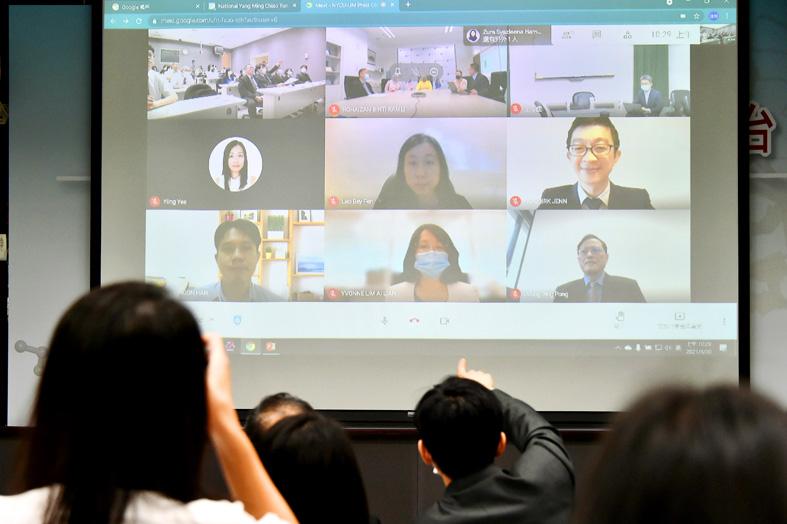A Taiwanese-Malaysian research team has developed a platform to identify drugs that might inhibit COVID-19 infections, which screens massive databanks of existing medicines.
The platform was developed to help scientists find drugs developed to treat other diseases that might prove efficacious against COVID-19, the developers yesterday told a news conference held by National Yang Ming Chiao Tung University (NYCU) in Taipei.
Chang Chia-ching (張家靖), a professor in the university’s Department of Biological Science and Technology, said that the SARS-CoV-2 virus, which causes COVID-19 infections, attaches itself to the ACE2 receptor on human cells.

Photo: Tu Chien-jung, Taipei Times
“Identifying ACE2 inhibitors rapidly is a top priority,” Chang said.
The researchers developed the platform to detect modulators that affect the interaction of SARS-CoV-2 and ACE2 using the electrochemical impedance spectroscopy (EIS) measurement technique.
The team thus far identified ramipril and perindopril, two medicines developed for treatment of cardiovascular diseases, as potentially interfering with the interaction of the virus and the cell, Chang said, adding that it also found another drug, enalapril, that might have a reverse effects.
The platform could also be used to search for medicines for treatment of other infectious diseases or even cancer, Chang said.
Kiew Lik-Voon, a professor in the University of Malaya’s Department of Pharmacology who is a member of the team, said that the medicines identified by the platform are preliminary results, adding that more work would have to be done to evaluate the drugs’ clinical effect.
Shieh Dar-bin (謝達斌), a professor in National Cheng Kung University’s (NCKU) Institute of Oral Medicine who is also a member of the team, praised the research as an example of successful cross-field collaboration.
The team comprised specialists from different academic areas, from electronic engineering to cell biology, he said.
NYCU president Lin Chi-hung (林奇宏) called the invention “inspiring,” saying that it was the result regular cooperation between Taiwanese and Malaysian researchers
University of Malaya vice president Noorsaadah Binti Abd Rahman attended the event via videoconferencing, saying that she was thankful for the participation of the Taiwanese researchers and hopes that more drugs would be identified.
The Taiwanese team members are from NCKU, NYCU, Chang Gung University, Taipei Veterans General Hospital and National Changhua University of Education.
Their study, titled “Development of flexible electrochemical impedance spectroscopy-based biosensing platform for rapid screening of SARS-CoV-2 inhibitors,” was published in last month’s issue of the Biosensors and Bioelectronics journal.

Alain Robert, known as the "French Spider-Man," praised Alex Honnold as exceptionally well-prepared after the US climber completed a free solo ascent of Taipei 101 yesterday. Robert said Honnold's ascent of the 508m-tall skyscraper in just more than one-and-a-half hours without using safety ropes or equipment was a remarkable achievement. "This is my life," he said in an interview conducted in French, adding that he liked the feeling of being "on the edge of danger." The 63-year-old Frenchman climbed Taipei 101 using ropes in December 2004, taking about four hours to reach the top. On a one-to-10 scale of difficulty, Robert said Taipei 101

A preclearance service to facilitate entry for people traveling to select airports in Japan would be available from Thursday next week to Feb. 25 at Taiwan Taoyuan International Airport, Taoyuan International Airport Corp (TIAC) said on Tuesday. The service was first made available to Taiwanese travelers throughout the winter vacation of 2024 and during the Lunar New Year holiday. In addition to flights to the Japanese cities of Hakodate, Asahikawa, Akita, Sendai, Niigata, Okayama, Takamatsu, Kumamoto and Kagoshima, the service would be available to travelers to Kobe and Oita. The service can be accessed by passengers of 15 flight routes operated by

Taiwanese and US defense groups are collaborating to introduce deployable, semi-autonomous manufacturing systems for drones and components in a boost to the nation’s supply chain resilience. Taiwan’s G-Tech Optroelectronics Corp subsidiary GTOC and the US’ Aerkomm Inc on Friday announced an agreement with fellow US-based Firestorm Lab to adopt the latter’s xCell, a technology featuring 3D printers fitted in 6.1m container units. The systems enable aerial platforms and parts to be produced in high volumes from dispersed nodes capable of rapid redeployment, to minimize the risk of enemy strikes and to meet field requirements, they said. Firestorm chief technology officer Ian Muceus said

MORE FALL: An investigation into one of Xi’s key cronies, part of a broader ‘anti-corruption’ drive, indicates that he might have a deep distrust in the military, an expert said China’s latest military purge underscores systemic risks in its shift from collective leadership to sole rule under Chinese President Xi Jinping (習近平), and could disrupt its chain of command and military capabilities, a national security official said yesterday. If decisionmaking within the Chinese Communist Party has become “irrational” under one-man rule, the Taiwan Strait and the regional situation must be approached with extreme caution, given unforeseen risks, they added. The anonymous official made the remarks as China’s Central Military Commission Vice Chairman Zhang Youxia (張又俠) and Joint Staff Department Chief of Staff Liu Zhenli (劉振立) were reportedly being investigated for suspected “serious